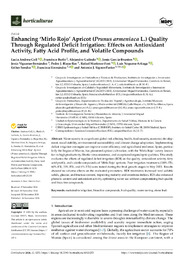Por favor, use este identificador para citar o enlazar este ítem:
https://hdl.handle.net/11000/37067Registro completo de metadatos
| Campo DC | Valor | Lengua/Idioma |
|---|---|---|
| dc.contributor.author | Andreu Coll, Lucía | - |
| dc.contributor.author | Burló, Francisco | - |
| dc.contributor.author | Galindo, Alejandro | - |
| dc.contributor.author | GARCIA BRUNTON, JESUS | - |
| dc.contributor.author | Vigueras-Fernández, Jesús | - |
| dc.contributor.author | Blaya-Ros, Pedro José | - |
| dc.contributor.author | Martinez, Rafael | - |
| dc.contributor.author | Noguera-Artiaga, Luis | - |
| dc.contributor.author | Sendra, Esther | - |
| dc.contributor.author | Hernández García, Francisca | - |
| dc.contributor.author | Signes-Pastor, Antonio Jose | - |
| dc.contributor.other | Departamentos de la UMH::Producción Vegetal y Microbiología | es_ES |
| dc.date.accessioned | 2025-07-30T12:04:21Z | - |
| dc.date.available | 2025-07-30T12:04:21Z | - |
| dc.date.created | 2024-11-26 | - |
| dc.identifier.citation | Horticulturae 2024, 10(12), 1253 | es_ES |
| dc.identifier.issn | 2311-7524 | - |
| dc.identifier.uri | https://hdl.handle.net/11000/37067 | - |
| dc.description.abstract | Water scarcity is a significant global risk affecting health, food security, economic development, social stability, environmental sustainability, and climate change adaptation. Implementing deficit irrigation strategies can improve water efficiency and agricultural resilience. Spain, particularly the Region of Murcia, has pioneered apricot cultivation, with the ‘Mirlo Rojo’ variety known for its high productivity, Sharka virus resistance, and exceptional organoleptic qualities. This study evaluates the effects of regulated deficit irrigation (RDI) on the quality, antioxidant activity, fatty acid profile, and volatile compounds of ‘Mirlo Rojo’ apricots. Four irrigation treatments (100% ETc, 60% ETc, 33% ETc, and 0% ETc) were tested during the final growth stages in May 2023. Results showed no adverse effects on the evaluated parameters. RDI treatments increased total soluble solids, glucose, and fructose content, improving maturity and sweetness indices. RDI also enhanced phenolic content and antioxidant activity, optimizing water use without compromising fruit quality and bioactive compounds | es_ES |
| dc.format | application/pdf | es_ES |
| dc.format.extent | 19 | es_ES |
| dc.language.iso | eng | es_ES |
| dc.publisher | MDPI | es_ES |
| dc.rights | info:eu-repo/semantics/openAccess | es_ES |
| dc.rights | Attribution-NonCommercial-NoDerivatives 4.0 Internacional | * |
| dc.rights.uri | http://creativecommons.org/licenses/by-nc-nd/4.0/ | * |
| dc.subject | Sustainable irrigation | es_ES |
| dc.subject | Bioactive compounds | es_ES |
| dc.subject | Fruit quality | es_ES |
| dc.subject | Water saving | es_ES |
| dc.subject | Stone fruit | es_ES |
| dc.title | Enhancing ‘Mirlo Rojo’ Apricot (Prunus armeniaca L.) Quality Through Regulated Deficit Irrigation: Effects on Antioxidant Activity, Fatty Acid Profile, and Volatile Compounds | es_ES |
| dc.type | info:eu-repo/semantics/article | es_ES |
| dc.relation.publisherversion | https://doi.org/10.3390/horticulturae10121253 | es_ES |

Ver/Abrir:
horticulturae-10-01253.pdf
1,62 MB
Adobe PDF
Compartir:
 La licencia se describe como: Atribución-NonComercial-NoDerivada 4.0 Internacional.
La licencia se describe como: Atribución-NonComercial-NoDerivada 4.0 Internacional.
.png)